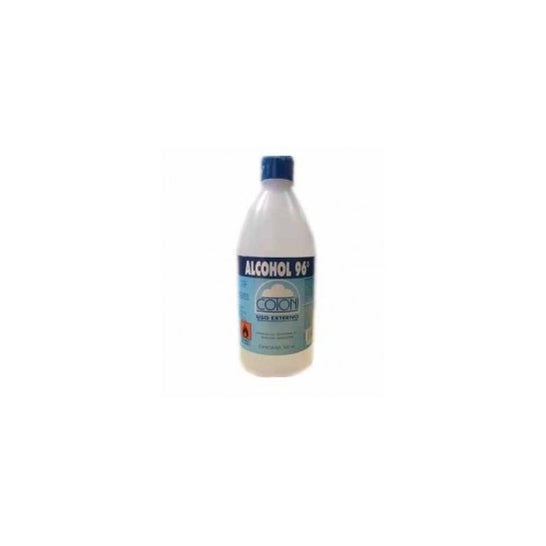Alcohol for external use of 96º of vegetable origin enhanced by the presence of isopropyl alcohol. High germicidal action on the skin, due to the penetration and disinfection of the sweat glands. It denatures the proteins of the bacterial protoplasm. It is not active against viruses and spores. Indicated for cleaning and antisepsis of healthy skin.
Suitable for human and veterinary use.
Topical use.
Cotoni Alcohol 96 250 ml
€2.08 by redeeming Health points. Log in
![]() Sent from Spain
Show details
Sent from Spain
Show details
Enviado por DocMorris
Helps to cleanse and disinfect healthy skin
250 ml
Shipping in 24-72h
€2.08 by redeeming Health points. Log in
![]() Sent from Spain
Show details
Sent from Spain
Show details
Enviado por DocMorris
Description
Instructions for use
Apply to healthy, clean and dry skin with a cotton pad, with properly cleaned hands and leave on for 2-3 minutes.
Composition
ETHYL ALCOHOL 60%, ISOPROPYL ALCOHOL 40%, DENATURED WITH BITREX 2 PPM, DIETHYL PHTHALATE 0.3%, DEMINERALISED WATER Q.S. 96º.
Price per 100 ML
Pharmaceutical Advice
Rubbing alcohol for sanitary use is an antiseptic for healthy skin. It is an effective substance to eliminate viruses and bacteria on the skin surface when used properly. However, it is less effective against bacterial spores, which are more resistant. Alcohol is used to prepare the skin before an injection or minor surgery. It should not be used to disinfect open wounds (other disinfectants are better served for this purpose), nor on damaged or irritated skin. It should not be applied to eyes, mucous membranes or very large skin areas. It should always be used externally. It may contain other disinfectant substances to boost its action.
We commonly find 96° or 70° alcohol in medicine cabinets. But how are they different? The difference lies in the degree of ethanol concentration that they contain. The 96° alcohol is higher in concentration. On the other hand, 70° alcohol is more diluted, i.e. it has a 30% water content. Both act as disinfectants, the former with faster action and the latter, although slower, more effective, as it can better penetrate the bacterial protoplasm. 70° alcohol is considered to have a greater antiseptic effect.
On the other hand, there are popular hydroalcoholic solutions in a gel format, for hand disinfection when soap and water are not available. They are usually less irritating than the direct application of alcohol, as they contain other moisturising and soothing ingredients. Hydroalcoholic gels with an alcohol concentration of around 70% are considered the most suitable for antiviral purposes. It is important to remember that all alcohol products are highly flammable and should be handled with caution.
Finally, ethyl alcohol or ethanol also has applications in personal care products. In cosmetics, it can be used as a preservative, dissolve other ingredients or for its astringent action, but in these formulations, it is found in much smaller quantities.
It should not be mixed with other substances and should be kept out of children’s week. In case of poisoning or accidental ingestion, seek medical advice immediately.
Safety and product information
Safety visual aids
At this time we do not have safety images for this product, but we are working on it. We encourage you to check back later for updates. In the meantime, we recommend that you read the safety information that comes with the product before using it. If you have any questions about safety, please do not hesitate to contact us. Also, if you wish, you can also return the product by following our terms and conditions.
Manufacturer details
At the moment we do not have the manufacturer's details, but we are working to add them as soon as possible. We invite you to check back later for updates. If you have any questions, please do not hesitate to contact us, we will be happy to help you.
RELATED SEARCHES ABOUT Disinfectants
New in Flesh wounds
- Nexcare N1530-1D Papel Adhesivo 25mmx5m 1ud
- Leukoplast Leukomed Skin Sensitive 8x10cm 5uds
- Alvita Agua Purificada 1L
- Euroreel Adhesivo Algodón 5mx1.25cm
- Hansaplast Second Skin Protection XL 3 apósitos
- Hansaplast Second Skin Protection Regular 6 apósitos
- Holbasic Alcohol Etilico Sanitario 70° 250ml
- Bastos Viegas Vendaje Gaza 10x10 10uds
- Master Aid Duolastic Vendaje Elastico7mx10cm
- Bastos Viegas Compresa 427/021 10x10 100uds

